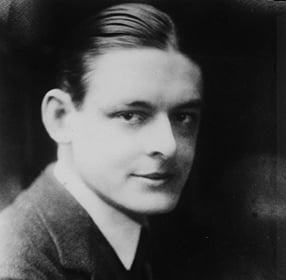Journey of the Magi
‘A cold coming we had of it,
Just the worst time of the year
For a journey, and such a long journey:
The ways deep and the weather sharp,
The very dead of winter.’
And the camels galled, sore-footed, refractory,
Lying down in the melting snow.
There were times we regretted
The summer palaces on slopes, the terraces,
And the silken girls bringing sherbet.
Then the camel men cursing and grumbling
And running away, and wanting their liquor and women,
And the night-fires going out, and the lack of shelters,
And the cities hostile and the towns unfriendly
And the villages dirty and charging high prices:
A hard time we had of it.
At the end we preferred to travel all night,
Sleeping in snatches,
With the voices singing in our ears, saying
That this was all folly.
Then at dawn we came down to a temperate valley,
Wet, below the snow line, smelling of vegetation;
With a running stream and a water-mill beating the darkness,
And three trees on the low sky,
And an old white horse galloped away in the meadow.
Then we came to a tavern with vine-leaves over the lintel,
Six hands at an open door dicing for pieces of silver,
And feet kicking the empty wine-skins,
But there was no information, and so we continued
And arrived at evening, not a moment too soon
Finding the place; it was (you may say) satisfactory.
All this was a long time ago, I remember,
And I would do it again, but set down
This set down
This: were we led all that way for
Birth or Death? There was a Birth, certainly,
We had evidence and no doubt. I had seen birth and death,
But had thought they were different; this Birth was
Hard and bitter agony for us, like Death, our death.
We returned to our places, these Kingdoms,
But no longer at ease here, in the old dispensation,
With an alien people clutching their gods.
I should be glad of another death.
This poem is in the public domain. Published in Poem-a-Day on December 24, 2023, by the Academy of American Poets.
“Journey of the Magi” was published as a pamphlet in August 1927 by Faber & Gwyer, being the first of T. S. Eliot’s contributions to a series called “the Ariel Poems.” In Critical Companion to T. S. Eliot: A Literary Reference to His Life and Work (Facts on File, 2007), Russell Elliott Murphy, a professor at the University of Arkansas, writes, “For all of their acquaintance with mystery, its human dimensions, Eliot offers the suggestion that the magi could not possibly have understood the profundities of the unfolding mystery that they were to witness in its initial manifestation. [. . .] The speaker seems to know, or at the very least intuit, that his age and his kind, and all the wisdom of his world, is coming to an end and that [the birth of Christ] is the signal of their death. [. . .] The speaker confesses that his long-ago experience has forever unsettled his life; he is ‘no longer at ease here’ in his familiar surroundings, but to what purpose he neither puzzles nor supposes. Like Eliot’s hollow men, he appears to have seen the light but is unable to either recognize its source or to follow it, so he shall die in the wilderness that, for Eliot, is a world without a coherent belief in a singular creation that serves a singular purpose.”

